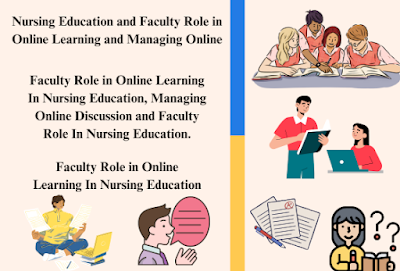The Faculty Role in Online Learning and Managing Online In Nursing Education. Encourage, motivate, and actively engage your students during the lesson. Assess and document learning progress. Correct students’ work and provide positive and constructive feedback. Maintain students’ attention and motivate distracted students.
The Faculty Role in Online Learning and Managing Online In Nursing Education
What role does your instructor play in this learning environment? Your instructor’s online presence ensures meaningful learning experiences for you and your classmates. Instructors carefully prepare the content that supports your learning in the course.
Nurse educators primarily teach future nurses clinical skills, patient care methods, and best practices for collaboration. However, they also assume a number of additional responsibilities in the academic and research aspects of the profession, including directing hospital-based research.
They offer advice, encouragement, and support, helping students overcome challenges and make informed decisions. Learning Facilitator: A professor creates a supportive learning environment in which students feel comfortable asking questions, developing ideas, and thinking critically.
A sense of community is created through online communication, participation, and relationship-building. Professors speak to the class as a whole. Professors communicate individually with students and engage them through thought-provoking questions.
The job of an online teacher is multifaceted and includes the daily tasks of being a consultant, facilitator, coach, friend, guide, instructor, mentor, tech expert, social media influencer, and tutor.
The role of faculty in nursing education shifts significantly when transitioning to online teaching environments. Unlike traditional face-to-face interactions, online courses often involve asynchronous communication, which limits real-time engagement between educators and students (Halstead, 2002). This change means that educators are less likely to be the primary source of information. Instead, their role evolves into that of a facilitator, guiding students through their learning experiences.
1. Facilitating Student Learning
In online settings, educators must adapt to a more facilitative role, encouraging students to take greater responsibility for their learning. This shift can be challenging for faculty new to online teaching, who might feel a loss of control over the learning process. Teaching online requires a re-evaluation of traditional beliefs about the educator’s role and the adoption of new teaching paradigms (Shovein, Huston, Fox, & Damazo, 2005). Despite these changes, the educator’s responsibilities remain crucial, including defining course outcomes, designing engaging learning activities, and evaluating student performance.
2. Managing Online Discussions
Encouraging Peer Interaction
A key aspect of online teaching involves managing discussions effectively. Faculty should encourage peer-to-peer interaction rather than focusing solely on student-instructor conversations. Discussions should be varied and include elements such as reflection, critical thinking, and post-clinical conferencing. Clear grading rubrics are essential to provide timely feedback, helping students understand whether they are meeting learning objectives (Bristol & Kyarsgaard, 2012).
Addressing Common Concerns
New online instructors often face concerns about managing asynchronous discussions and optimizing time. Research indicates that online teaching can increase faculty workload due to additional time spent on course preparation and student interactions (Ryan et al., 2005; Anderson & Avery, 2008). Further research is needed to fully understand these demands.
3. Strategies for Effective Online Discussion Management
Time Management and Communication
Effective time management is crucial due to the high volume of student communication in online courses. To manage this, educators should establish clear guidelines for response times, set up electronic filing systems for course communications, and use dedicated email accounts to separate student messages from other correspondence.
Implementing Structured Communication Strategies
To streamline communication, faculty can:
- Define response times (e.g., within 48 hours) and communicate this expectation to students.
- Create and maintain individual student electronic file folders for course-related communication.
- Use a separate email account or CMS for student communications.
- Set up “electronic” office hours for student interactions.
- Develop standardized responses for frequently asked questions to save time and provide consistent feedback.
Promoting Student Leadership and Collaboration
Incorporating strategies like blocking out dedicated time for online course management and involving students in peer feedback can enhance efficiency. Students can critique assignments, lead discussions, and participate in collaborative learning activities, which helps manage feedback and fosters active learning (Phillips, 2005). Rotating student discussion leaders can provide leadership opportunities for all students and reduce the dependency on faculty for feedback.
Conclusion
Navigating the online learning landscape in nursing education involves adapting to new roles, managing increased communication, and implementing effective strategies to ensure a productive and engaging learning environment. By embracing these changes and employing strategic management techniques, faculty can enhance the online educational experience for both themselves and their students.
Faculty Role in Online Learning and Managing Online In Nursing Education
Read More:
https://nurseseducator.com/didactic-and-dialectic-teaching-rationale-for-team-based-learning/
https://nurseseducator.com/high-fidelity-simulation-use-in-nursing-education/
First NCLEX Exam Center In Pakistan From Lahore (Mall of Lahore) to the Global Nursing
Categories of Journals: W, X, Y and Z Category Journal In Nursing Education
AI in Healthcare Content Creation: A Double-Edged Sword and Scary
Social Links:
https://www.facebook.com/nurseseducator/
https://www.instagram.com/nurseseducator/
https://www.pinterest.com/NursesEducator/
https://www.linkedin.com/in/nurseseducator/
https://www.researchgate.net/profile/Afza-Lal-Din
https://scholar.google.com/citations?hl=en&user=F0XY9vQAAAAJ

Наиболее важные новости моды.
Абсолютно все мероприятия мировых подуимов.
Модные дома, торговые марки, haute couture.
Свежее место для трендовых хайпбистов.
https://enovosibirsk.ru/read/2024-01-15-afrikanskie-gepardy-raduyutsya-snegu-v-novosibirskom-zooparke/
https://kirov.rftimes.ru/news/2024-04-09-gk-interstroy-nachinaet-prodazhi-kvartir-v-zhk-ay-petri-v-yalte
https://rftimes.ru/news/2024-03-03-russkiy-treyler-dramy-pamyat-s-dzhessikoy-chesteyn-i-piterom-sarsgaardom
https://sevastopol.rftimes.ru/news/2024-07-07-ostavshiesya-postradavshie-pri-atake-vsu-v-bolnitsah-sevastopolya-i-moskvy
https://emurmansk.ru/pub/2023-12-15-murmanskie-deputaty-podderzhali-izmeneniya-v-sertifikate-na-zhile-detyam-sirotam/